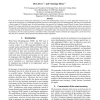215 search results - page 19 / 43 » Word Sense Disambiguation using Conceptual Density |
82
Voted
TSD
2001
Springer
15 years 3 months ago
2001
Springer
Two kinds of systems have been defined during the long history of WSD: principled systems that define which knowledge types are useful for WSD, and robust systems that use the info...
LREC
2010
15 years 14 days ago
2010
Given the recent trend to evaluate the performance of word sense disambiguation systems in a more application-oriented set-up, we report on the construction of a multilingual benc...
111
click to vote
TAL
2010
Springer
14 years 9 months ago
2010
Springer
Mihalcea [1] discusses self-training and co-training in the context of word sense disambiguation and shows that parameter optimization on individual words was important to obtain g...
128
Voted
AAAI
2011
13 years 11 months ago
2011
Effective access to knowledge within large declarative memory stores is one challenge in the development and understanding of long-living, generally intelligent agents. We focus o...
PAMI
2010
14 years 9 months ago
2010
— Word sense disambiguation (WSD), the task of identifying the intended meanings (senses) of words in context, has been a long-standing research objective for natural language pr...

